Mouth Cancer Symptoms -
The Most Important things
It's important to notice mouth cancer symptoms as soon as they appear. The sooner any possible tumor is detected, the better the outlook. That means TREATMENT will be faster and less disruptive to your normal life, AND you will have a much better chance of a 100% cure.
If you notice something that looks odd or feels strange, DO NOT put off getting it checked by a dentist.
If you can pick up a cancer early, it will be quick to treat and give you the BEST possible chance of a successful result.
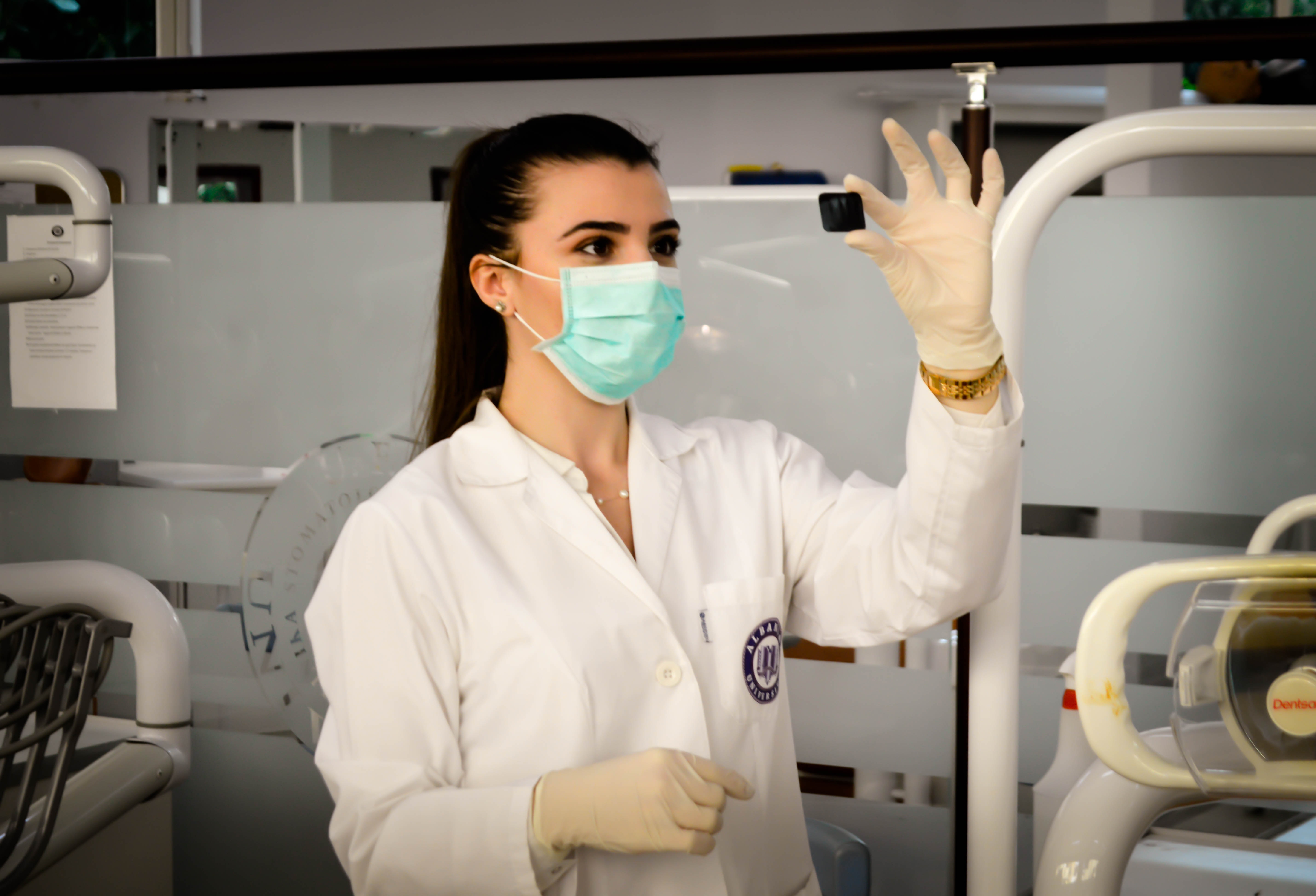 mouth cancer symptoms
mouth cancer symptomsThe problem is that EARLY mouth cancer symptoms are often hard to spot. Most people won't get any obvious early symptoms of oral cancer at all. But here is ONE GOLDEN RULE:
IF YOUR DENTIST TELLS YOU THERE'S A PROBLEM, DO WHAT HE SAYS. No exceptions. NO excuses. This sounds dramatic, but it's true; IF YOU WANT TO LIVE, get that odd thing checked, then do what your health professionals tell you!
WARNING -
The images below are shocking, but show what can happen if you ignore your dentist's advice. This lady had a sore, slightly swollen gum at the back of her mouth. The first photo shows what the dentist saw.
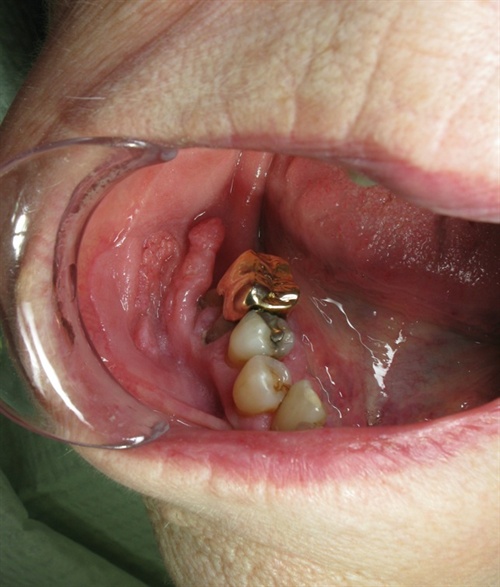 the early appearance
the early appearanceIn the image above you can see a flap of gum by the last two molars. It looks a bit odd, but not too serious, right?
Unfortunately, for personal reasons, this lady did not take her dentist's advice to see a specialist. She did nothing for over 2 years. Then she turned up at her dentist's office again, in a much worse condition.
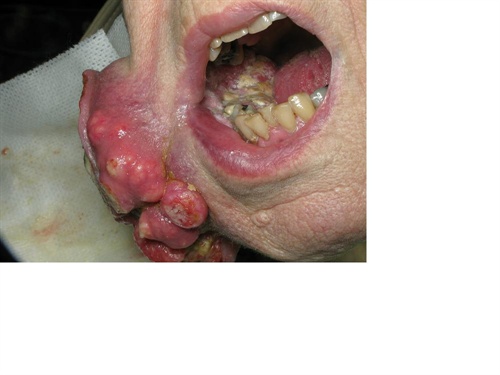 Two years later, without any treatment
Two years later, without any treatmentThe tumor has grown extremely aggressively. Treatment options now are very limited.
DO NOT IGNORE any odd symptoms in your mouth!
The pictures above show a very extreme case, which is, thankfully, quite rare. BUT IT CAN HAPPEN. Most people will react if something is not right in their mouth, and they will get treatment much earlier.
You may get one or two of the following mouth cancer symptoms;
- A white or red patch in the mouth or on the lip. A white or red patch inside the mouth or on the lip is one of the most common symptoms of oral cancer. It may also look like a white patch with red speckles. White and red patches can be the early appearance of cells becoming abnormal. If they are left untreated, they may turn into a tumor.
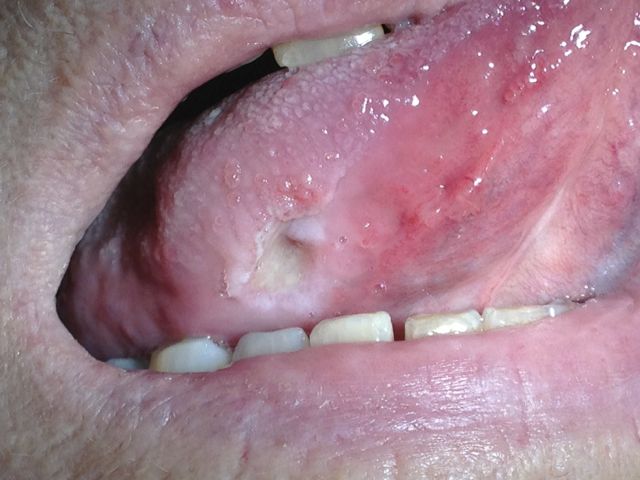 an early tumor on the tongue
an early tumor on the tongueAn ulcer, blister or sore spot in your mouth.
An ulcer or sore spot in your mouth or on your lip that doesn't heal can be one of the early mouth cancer symptoms. Sores that last longer than 10 days without healing should definitely be checked by a dentist.
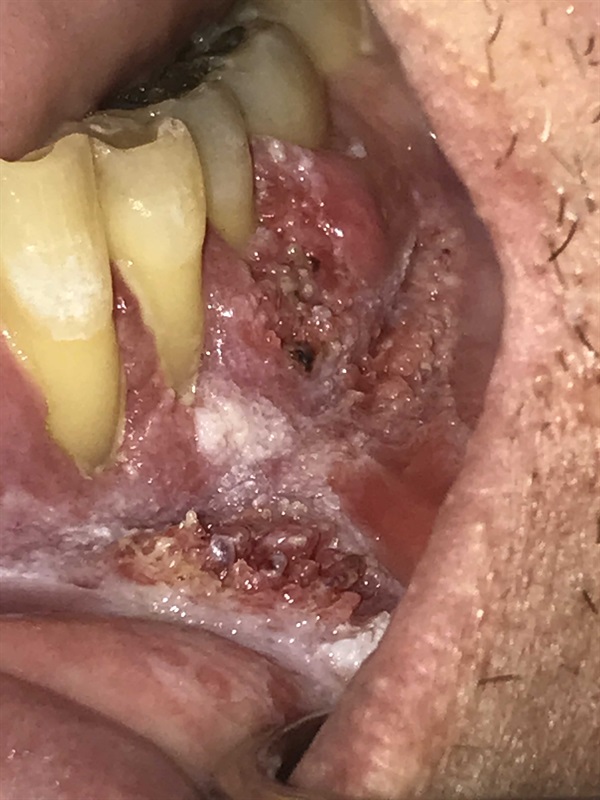 the gum looks very strange . . .
the gum looks very strange . . .The image above shows an aggressive tumor on the gum.
- Difficulty in swallowing.
- If you're having problems with swallowing, you may also have difficulty chewing, moving your jaw, or moving your tongue. This symptom is NOT specific to oral cancer, and can be caused by other conditions too. But you should still see your dentist about it!
- An earache.
- A frequent or persistent earache should be checked out by your medical practitioner. An earache is usually caused by an ear infection. BUT, in some cases, it may be related to oral cancer.
- Changes in the way your teeth bite together.
- This includes your dentures not fitting correctly. A tumor within the jawbone can cause your teeth to shift position. You might notice changes in the way your teeth fit together when you bite, and possibly changes in the way a denture fits.
- Bleeding from the mouth.
- Bleeding from the mouth can be caused by many things. Easily the most common cause is simple gum disease. BUT any bleeding from your mouth is NOT normal, and needs to be checked out by a dentist. It is one of the important mouth cancer symptoms.
- A lump in the tongue, lip or neck.
- Any swelling or lump in your mouth should be looked at by a dentist. By far the most frequent cause of a swelling or lump is an infection, such as a dental abscess over a dead tooth. But once again, any swelling is NOT normal, and is a signal that something is wrong.
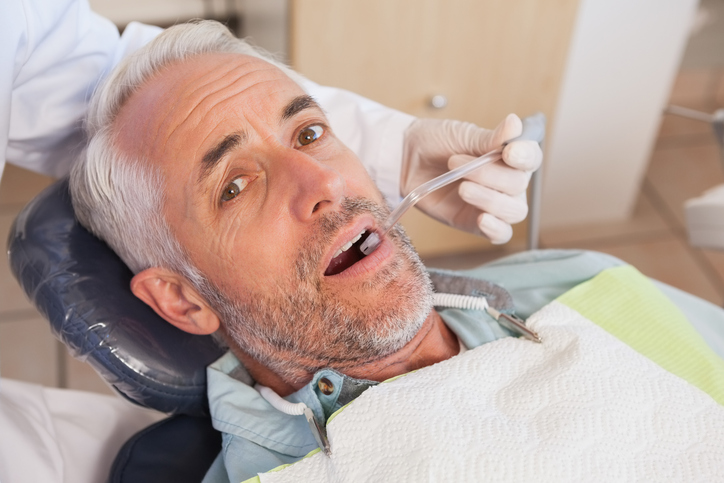 get that odd thing checked!
get that odd thing checked!Mouth Cancer Symptoms
Mouth cancer is basically an overgrowth of some types of cells in the mouth. Mouth cancer includes any cancer that starts anywhere in the mouth, for example:
- Lips.
- Tongue - see tongue cancer pictures.
- Gums.
- Jaw bone - see my page on cancer of the lower jaw.
- Under the tongue.
- Inside the cheeks and lips.
- Your palate (roof of the mouth)
Types of mouth cancer
Nearly all mouth cancers are of the type "squamous cell carcinoma". These develop in the special cells that line the inside of your mouth. One of the real dangers of this type of cancer is that it can go unnoticed in its early stages.
It is frequently painless at first, and there's not much to see when it's small. However your dentist can see or feel the changes in the mouth tissues while the tumor is still very small, or in its earliest stages.
Read more about tongue cancer at cancer of the tongue
Causes of mouth cancer symptoms
Like all cancers, we don't know the precise cause of each tumor that develops. However we CAN say what factors seem to be involved in most cases:
- Smoking tobacco in any form, such as cigarettes, cigars and pipes.
- Chewing tobacco, again in any form. This includes betel quid and gutkha.
- Drinking excessive amounts of alcohol, particularly if you also smoke or chew tobacco.
- A previous cancer of the mouth.
- Over-exposure to the sun or UV light - this seems to increase the risk of lip cancer in particular.
- A weakened immune system. People who are taking medicines that suppress the immune system, OR have AIDS or are HIV positive, are more likely to develop mouth cancer.
Diagnosis of mouth cancer
You definitely get the best chance of a complete recovery if the tumor is diagnosed and treated early. If you visit your dentist for regular check-ups, he will probably be the first person to see something in your mouth that could be a tumor. He will refer you to the nearest hospital or oral medicine specialist for a definite diagnosis. If they agree with your dentist's concerns, a biopsy will be done to confirm the diagnosis.
 a doctor explains
a doctor explainsOf course, if you think you have any mouth cancer symptoms at any time, don't hesitate FOR ONE SECOND to phone your dentist and make an appointment as soon as you can.
Staging the cancer
If your biopsy confirms that you have a cancer, you will need to have some more tests to find out how far it has spread, and to help decide the best type of treatment. This process is called staging the cancer. The tests may include the following:
- X-rays of your upper and lower jaws, also called a "panoramic" X-ray.
- A barium swallow. This means swallowing a barium-containing liquid, which is visible on X-rays. The X-rays can then show up anything unusual in your throat.
- Scans. There are many types of scans available now to doctors. The most common are ultrasound scans, MRI scans or CT scans. These are carried out to check all the tissues in your face, throat and chest.
- Extra biopsies of lymph nodes near the site of the tumor. Lymph nodes are part of your immune system.
You can read more about the stages of cancer at Stage 3 Cancer.
Treatment of mouth cancer
Treatment depends on the type of mouth cancer, your mouth cancer symptoms, where it is and how far it has spread. There are three main treatments for mouth cancer. Your doctor will go over these options with you:
- Surgery. This option usually involves removing just the affected tissue. How much surgery is needed depends on how much tissue is affected. Surgery is sometimes combined with chemotherapy or radiotherapy to make sure all the cancer cells have been destroyed. You can read more about surgery for tongue cancer at Glossectomy.
- Radiotherapy. In radiotherapy, very fine beams of focussed radiation are used to kill cancer cells. Read more at Radiation Therapy Side Effects.
- Chemotherapy. This involves using anti-cancer drugs to destroy cancer cells. They are usually given as injections, but sometimes may be given as tablets.
- Biological therapy. In this process, specially manufactured antibodies are used to help prevent further tumor growth. Then it's possible to destroy the cancer cells with precisely targeted radiotherapy. This is a fairly new type of treatment, and has only been approved so far for use in cases of advanced squamous cell cancer of the head and neck.
Prevention of mouth cancer
There are some simple things you can do to help reduce your risk of mouth cancer. These include:
- Visiting your dentist for regular check-ups, at least once a year.
- Be aware of any changes in your mouth, like sore patches or ulcers that don't heal.
- Don't smoke cigarettes, cigars, or pipes.
- Don't chew any sort of tobacco.
- Try to reduce the amount of alcohol you drink.
- Remember to include fruit and especially vegetables in your daily food.
- Protect your skin from bright sun, and avoid sunbeds. Use a high-quality sun screen.
Mouth cancer symptoms are hard to spot in the early stages. This is why it's important to have a look in your own mouth each week, and make a note of anything different.
If it hasn't settled down or healed within 10 days, go see your dentist. He will be able to spot the symptoms of oral cancer at an early stage, and arrange treatment. When it comes to mouth cancer, symptoms should be taken seriously!



